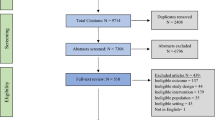Abstract
Little is known about the capacity of community providers to provide military informed evidence based services for posttraumatic stress disorder (PTSD). We conducted a regional, web-based survey of 352 community mental health care providers that sought to identify clinical practices, training needs, and predictors of evidence based treatment (EBT) use for PTSD. Overall, 49 % of providers indicated they seldom or never use a validated PTSD screening instrument. Familiarity with EBTs, specifically prolonged exposure (PE; χ2(4) = 14.68, p < .01) and cognitive processing therapy (CPT; χ2(4) = 4.55, p < .05), differed by provider type. Of providers who received training in PE or CPT (N = 121), 75 % reported using treatment in their practice, which was associated with having received clinical supervision (χ2 (1) = 20.16, p < .001). Widely disseminated trainings in empirically supported PTSD assessment and treatment, and implementation of case supervision in community settings are needed.
Similar content being viewed by others
References
Bauer, M. S., Williford, W. O., McBride, L., McBride, K., & Shea, N. M. (2005). Perceived barriers to health care access in a treated population. International Journal of Psychiatry in Medicine, 35(1), 13–26. doi:10.2190/u1d5-8b1d-uw69-u1y4.
Copeland, L. A., Zeber, J. E., Bingham, M. O., Pugh, M. J., Noël, P. H., Schmacker, E. R., & Lawrence, V. A. (2011). Transition from military to VHA care: Psychiatric health services for Iraq/Afghanistan combat-wounded. Journal of Affective Disorders, 130(1–2), 226–230. doi:10.1016/j.jad.2010.10.017.
Department of Veterans Affairs. (2010). Management of Post-Traumatic Stress Working Group. VA/DoD clinical practice guidelines for management of post traumatic stress. Retrieved from http://www.healthquality.va.gov/ptsd/ptsd_full.pdf
Foa, E. B., Hembree, E. A., & Rothbaum, B. O. (2007). Prolonged exposure therapy for PTSD: Emotional processing of traumatic experiences: Therapist guide. Treatments That Work. doi:10.1093/med:psych/9780195308501.001.0001.
Hamblen, J. L., Schnurr, P. P., Rosenberg, A., & Eftekhari, A. (2009). A guide to the literature on psychotherapy for PTSD. Psychiatric Annals, 39(6), 348–354. doi:10.3928/00485713-20090515-02.
Hoge, C. W., Terhakopian, A., Castro, C. A., Messer, S. C., & Engel, C. C. (2007). Association of posttraumatic stress disorder with somatic symptoms, health care visits, and absenteeism among Iraq war veterans. The American Journal of Psychiatry, 164(1), 150–153. doi:10.1176/appi.ajp.164.1.150.
Ingram, D. D., & Franco, S. J. (2013). NCHS urban–rural classification scheme for counties. National Center for Health Statistics. Vital and Health Statistics, 2(166), DHHS Publication No. 2014–1366.
Karlin, B. E., Ruzek, J. I., Chard, K. M., Eftekhari, A., Monson, C. M., Hembree, E. A., et al. (2010). Dissemination of evidence-based psychological treatments for posttraumatic stress disorder in the Veterans Health Administration. Journal of Traumatic Stress, 23(6), 663–673. doi:10.1002/jts.20588.
Kilpatrick, D. G., Best, C. L., Smith D. W., Kudler, H., Cornelison-Grant, V. (2011). Serving those who have served: Educational needs of health care providers working with military. Charleston, SC: Medical University of South Carolina Department of Psychiatry, Natoinal Crime Victims Research and Treatment Center.
Koblinsky, S., Leslie, L. A., & Cook, E. T. (2014). Treating behavioral health conditions of OEF/OIF veterans and their families: A state needs assessment of civilian providers. Military Behavioral Health, 2(2), 162–172. doi:10.1080/21635781.2014.890884.
Lew, H. L., Vanderploeg, R. D., Moore, D. F., Schwab, K., Friedman, L., Yesavage, J., et al. (2008). Overlap of mild TBI and mental health conditions in returning OIF/OEF service members and veterans. Journal of Rehabilitation Research and Development, 45(3), xi–xvi. Retrieved from http://www.ncbi.nlm.nih.gov/pubmed/18629743
Meichenbaum, D. (1985). Stress inoculation therapy. New York, NY: Pergamon Press.
National Council for Behavioral Health. (2012). Meeting the behavioral health needs of veterans. Retrieved from http://www.thenationalcouncil.org/wp-content/uploads/2013/02/Veterans-BH-Needs-Report.pdf.
Noy, C. (2008). Sampling knowledge: The hermeneutics of snowball sampling in qualitative research. International Journal of Social Research Methodology, 11(4), 327–344.
Owens, B. D., Kragh, J. F., Wenke, J. C., Macaitis, J., Wade, C. E., & Holcomb, J. B. (2008). Combat wounds in operation Iraqi freedom and operation enduring freedom. The Journal of Trauma, 64(2), 295–299. doi:10.1097/TA.0b013e318163b875.
Resick, P. A., & Schnicke, M. K. (1992). Cognitive processing therapy for sexual assault victims. Journal of Consulting and Clinical Psychology, 60(5), 748–756. doi:10.1037/0022-006x.60.5.748.
Schell, T. L., & Marshall, G. N. (2008). Survey of individuals previously deployed for OEF/OIF. In T. Tanielian & L. H. Jaycox (Eds.), Invisible wounds of war: Psychological and cognitive injuries, their consequences, and servcies to assist recovery (pp. 81–115). Santa Monica, CA: RAND Center for Military Health Policy Research.
Shapiro, S. (2001). Enhancing self-belief with EMDR: Developing a sense of mastery in the early phase of treatment. American Journal of Psychotherapy, 55(4), 531–542. Retrieved from http://www.ncbi.nlm.nih.gov/pubmed/11824218
Stein, M. B., & McAllister, T. W. (2009). Exploring the convergence of posttraumatic stress disorder and mild traumatic brain injury. The American Journal of Psychiatry, 166(7), 768–776. doi:10.1176/appi.ajp.2009.08101604.
Tanielian, T., Epley, C., Farmer, C. M., Engel, C. C., & Jaycox, L. H. (2014). Ready to serve. Community-based provider capacity to deliver culturally competent, quality mental health care to veterans and their families. Santa Monica, CA: RAND Corporation.
Veterans Health Administration. (2013). Analysis of VA health care utilization among Operation Enduring Freedom (OEF), Operation Iraqi Freedom (OIF), and Operation New Dawn (OND) veterans, (January), 1–13. Retrieved from http://www.publichealth.va.gov/epidemiology/reports/oefoifond/health-care-utilization/index.asp
Veterans’ Access to Care Through Choice, Accountability and Transparency Act of 2014. (2014). https://www.congress.gov/bill/113th-congress/senate-bill/2450
Vogt, D., Fox, A. B., & Di Leone, B. A. L. (2014). Mental health beliefs and their relationship with treatment seeking among U.S. OEF/OIF veterans. Journal of Traumatic Stress, 27(3), 307–313. doi:10.1002/jts.21919.
Washington, D. L., Bean-Mayberry, B., Riopelle, D., & Yano, E. M. (2011). Access to care for women veterans: Delayed healthcare and unmet need. Journal of General Internal Medicine, 26(Suppl 2), 655–661.
Acknowledgments
This study was supported by education focused grants from Welcome Back Veterans and the McCormick Foundation, as well as from the Bob Woodruff Foundation. The authors thank Dr. Terri Tanielian and the RAND Corporation for their guidance.
Author information
Authors and Affiliations
Corresponding author
Rights and permissions
About this article
Cite this article
Richards, L.K., Bui, E., Charney, M. et al. Treating Veterans and Military Families: Evidence Based Practices and Training Needs Among Community Clinicians. Community Ment Health J 53, 215–223 (2017). https://doi.org/10.1007/s10597-016-0013-7
Received:
Accepted:
Published:
Issue Date:
DOI: https://doi.org/10.1007/s10597-016-0013-7




